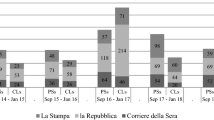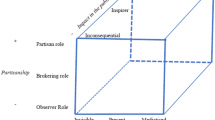Abstract
Participation in the public debate constitutes one of the most evident avenues for political scientists to demonstrate the social relevance of the discipline. This article focuses on two questions: the types of roles political scientists adopt in their public interventions and the potential tensions between their public engagement and the epistemic norms regulating academic and research activities. We investigate these questions in the context of very salient political debates, involving a high degree of political confrontation, where basic political beliefs, values, identities, and interests are at stake. Focusing on the case of the public debate surrounding the Catalan independence crisis (2010–2018), we demonstrate that in this type of context, (1) political scientists mostly adopt a partisan stance in their public interventions, yet it is also frequent that this is combined with the presence of academic elements in their discourse; (2) demand side factors (media outlets’ editorial lines) reinforce these partisan dynamics. These findings show that opportunities for increasing the social relevance of political scientists in these highly contentious contexts might come at the price of creating tensions that could erode the legitimacy of political science knowledge before the public.

Source: Authors’ own elaboration

Source: Authors’ own elaboration

Source: Authors’ own elaboration

Source: Authors’ own elaboration

Source: Authors’ own elaboration
Similar content being viewed by others
Notes
The survey was carried out in 2018 in the context of the COST Action “Professionalisation and Social Impact of European Political Science” (PROSEPS) (http://proseps.unibo.it/proseps/). The survey was carried out in 37 European countries (plus Israel and Turkey) among academic political scientists. The total number of respondents was 2354.
This would require an entirely different research design, analysing participation of academic political scientists in the context of all the interventions in this public debate. However, this is beyond our purposes in this article.
Spain is classified by Hallin and Mancini (2004) among pluralist polarised systems. These systems “[tend] to be associated with a high degree of political parallelism: newspapers are typically identified with ideological tendencies, and traditions of advocacy and commentary-oriented journalism are often strong.” (2004: 61). Also, “the press is marked by a strong focus on political life (…). Instrumentalization of the media by the government, by political parties, and by industrialists with political ties is common. Public broadcasting tends to follow the government or [parliament] (…). The state plays a large role as an owner, regulator, and funder of media, though its capacity to regulate effectively is often limited.” (2004: 73).
See, for instance, the manifesto of the unitary pro-independence coalition Junts pel Sí (Together for Yes) for the 2015 Catalan election (Junts pel Sí, 2015). Junts pel Sí was integrated by ERC and one of the parties that formed the disappeared CiU, Convergència Democrática de Catalunya (CDC).
We used as a reference the audience surveys produced three times a year by the AIMC (Asociación para la Investigación de los Medios de Comunicación – Association for Mass Media Research) (http://reporting.aimc.es/index.html#/main/diarios, accessed 26/04/2020).
The watershed between both editorial lines was marked by the replacement of the newspapers’ director in December 2013, who two years later founded a new pro-independence newspaper (see “La Vanguardia cambia de director para descolgarse del proceso soberanista”, Eldiario.es, 13/12/2013, available at https://www.eldiario.es/politica/Vanguardia-director-descolgarse-proceso-soberanista_0_206829738.html (accessed 01/06/2020)).
References
Álvaro, F.-M. 2019. Ensayo general de una revuelta: las claves del proceso catalán. Barcelona: Galaxia Gutemberg.
Bandola-Gill, J., M. Brans, and M. Flinders. 2021. Incentives for impact: relevance regimes through a cross-national perspective. In Political science in the shadow of the state: Research, relevance & deference, ed. R. Eisfeld and M. Flinders. Basingstoke: Macmillan.
Barrio, A., and B. N. Field. 2018. The push for independence in Catalonia. Nature Human Behaviour 2018 (2): 713–715. https://doi.org/10.1038/s41562-018-0439-8.
Barrio, A., and J. Rodríguez-Teruel. 2017. Reducing the gap between leaders and voters ? Elite polarization, outbidding competition, and the rise of secessionism in Catalonia. Ethnic and Racial Studies 40 (10): 1776–1794.
Büchel, F., E. Humprecht, L. Castro-Herrero, S. Engesser, and M. Brüggemann. 2016. Building empirical typologies with QCA: Toward a classification of media systems. International Journal of Press/politics 21 (2): 209–232.
Chaqués-Bonafont, L., A.M. Palau, and F.R. Baumgartner. 2015. Agenda Dynamics in Spain. Basingstoke: Palgrave Macmillan.
Coll, J., I. Molina, and M. Arias-Maldonado, ed. 2018. Anatomía del procés: Claves de la mayor crisis de la democracia española. Barcelona: Debate.
Flinders, M. 2013. The tyranny of relevance and the art of translation. Political Studies Review 11 (2): 149–167.
García, L. 2018. El naufragio: la deconstrucción del sueño independentista. Barcelona: Peninsula.
Guest, G., K.M. MacQueen, and E.E. Namey. 2012. Applied thematic analysis. Los Angeles: Sage.
Guinjoan, M., T. Rodon, and M. Sanjaume. 2013. Catalunya, un pas endavant. Barcelona: Fundació Josep Irla / Angle Editorial.
Hallin, D.C., and P. Mancini. 2004. Comparing media systems: Three models of media and politics. Cambridge: Cambridge University Press.
Jenkins-Smith, H.C., D. Nohrstedt, C.M. Weible, and K. Ingold. 2017. The advocacy coalition framework: An overview of the research program. In Theories of the Policy Process, ed. C.M. Weible and P.A. Sabatier, 135–171. Boulder: Westview Press.
Junts pel Sí. 2015. Programa electoral. Barcelona: Junts pel Sí. Retrieved from: https://juntspelsi.s3.amazonaws.com/assets/150905_Programa_electoral_v1.pdf (accessed 18/08/2020).
Kahneman, D. 2011. Thinking, Fast and Slow. New York: Farrar, Straus and Giroux.
López, J., and M. Sanjaume-Calvet. 2020. The political use of de facto referendums of independence: the case of Catalonia. Representation 56 (4): 501–519.
Majone, G. 1989. Evidence, argument and persuasion in the policy process. New Haven: Yale University Press.
March, O. 2018. Los entresijos del ‘procés.’ Madrid: Los Libros de la Catarata.
Martí, J. 2018. Cómo ganamos el proceso y perdimos la república. Barcelona: EDLibros.
Martínez, G. 2016. La gran ilusión: mito y realidad del proceso indepe. Barcelona: Debate.
Mas, A. 2020. Cabeza fría, corazón caliente: el procés en primera persona. Barcelona: Península.
Mercier, H., and D. Sperber. 2017. The Enigma of reason. Cambridge, MA: Harvard University Press.
PSOE. 2013. Un nuevo pacto territorial: la España de todos. Declaración del Consejo Territorial. Granada, 6 Julio 2013. Madrid: PSOE.
Real-Dato, J., and L. Verzichelli. 2021. In search of relevance: European political scientists and the public sphere in critical times. European Political Science.
Requejo, F., and M. Sanjaume. 2013. Recognition and political accommodation: from regionalism to secessionism: The Catalan case. Barcelona: Grup de Recerca en Teoria Politica, University Pompeu Fabra.
Le Roux, B., and H. Rouanet. 2010. Multiple correspondence analysis. Thousand Oaks: Sage.
Schneider, A.L., and H. Ingram. 1997. Policy design for democracy. Lawrence: University Press of Kansas.
Schreier, M. 2014. Qualitative content analysis. In: Flick, U. (Eds.), The SAGE handbook of qualitative data analysis, pp. 170–183. London: Sage.
Shapiro, M.J. 1984. Introduction. In: Shapiro, M. J. (Eds.), Language and politics, pp. 1–12. New York: New York University Press.
Tsirbas, Y., and L. Zirganou-Kazolea. 2021. Greek political scientists under the crisis and the case of the Greek bail-out referendum: an intellectual barricade protecting the status quo? European Political Science.
Verzichelli, L., J. Real-Dato, and G. Vicentini. 2019. Social visibility and Impact of European Political Scientists. Proseps Working Group 3 Report. Retrieved from: http://proseps.unibo.it/wp-content/uploads/2019/10/WG3.pdf (accessed 30/12/2020).
Vicentini, G., and A. Pritoni. 2021. Down from the “Ivory Tower”? Not so much…Italian political scientists and the constitutional referendum campaign. European Political Science.
Acknowledgements
The authors thank Luis de la Calle, Guillermo Rico, all the participants in the Working Group 3 of the PROSEPS COST Action, as well as the reviewers and editors at European Political Science, for their helpful comments and suggestions on previous versions of this article.
Author information
Authors and Affiliations
Corresponding author
Additional information
Publisher's Note
Springer Nature remains neutral with regard to jurisdictional claims in published maps and institutional affiliations.
Supplementary Information
Below is the link to the electronic supplementary material.
Rights and permissions
About this article
Cite this article
Real-Dato, J., Rodríguez-Teruel, J., Martínez-Pastor, E. et al. The triumph of partisanship: political scientists in the public debate about Catalonia’s independence crisis (2010–2018). Eur Polit Sci 21, 37–57 (2022). https://doi.org/10.1057/s41304-021-00341-x
Accepted:
Published:
Issue Date:
DOI: https://doi.org/10.1057/s41304-021-00341-x




